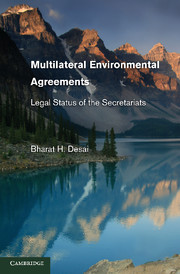4 - Host Institution Arrangements
Published online by Cambridge University Press: 05 September 2013
Summary
Introduction
As discussed in Chapter 3, multilateral environmental agreements (MEAs) have emerged as a unique regulatory technique. They appear to be need-based responses to address specific sectoral environmental problems. The regulatory exercise results in a legal instrument that provides fulcrum around which the entire institutionalized international environmental cooperation revolves. As a corollary to both the initial legal instrument designed by the contracting parties as well as subsequent work on a built-in lawmaking mechanism, it is usually felt necessary to have an institutional hub that services the needs of the legal regime. In this context, the issue of “location” of the institutional hub (generally called the secretariat) becomes crucial.
Treaty Mandate
The process of engaging a large number of sovereign states in mega-treaties – in some cases they have universal participation – has spun its own web. The Charter of the United Nations (UN) is the best example of such a treaty. In the course of the past 60 years, the gigantic process of “institutionalization” within the UN has contributed to the development of what may be called the “UN system” and even the “United Nations Law.” The treaties dealing with various subjects take shape as per their specific circumstances and are guided by their own internal and external dynamics.
As discussed earlier in this book, the treaties that seek to govern environmental matters are sui generis. MEAs are treaties governed by international law, with sovereign states as their parties.
- Type
- Chapter
- Information
- Multilateral Environmental AgreementsLegal Status of the Secretariats, pp. 97 - 132Publisher: Cambridge University PressPrint publication year: 2010



